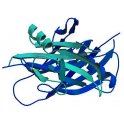
- Remove this product from my favorite's list.
- Add this product to my list of favorites.
Products
Newsletter
 |  |  |  |  |  |

Background: Protein kinase C (PKC) is a family of serine-threonine kinases, which are classified into three major groups: classical PKCs (α, β and γ), novel PKCs (δ, ε, η, and θ) and atypical PKCs (μ, ξ and ι). PKCδ consists of a C-terminal kinase domain and a N-terminal regulatory domain, formed by a C1 domain and a C2-like region instead of an authentic C2 region. Activation of PKC delta involves recruitment to the membrane and interaction with phospholipids and diacylglycerol. Furthermore, fully active protein results upon phosphorylation of the activation loop. PKC delta slows proliferation, induces cell cycle arrest, and enhances the differentiation of various undifferentiated cell lines. Additionally, PKC delta plays a central role in the genotoxic stress response leading to the induction of apoptosis.
Recombinant human Protein kinase C (PKC) delta, recombinant and active enzyme, full lenght protein with N-terminal GST-tag, N-terminally fused to GST-HIS6-Thrombin cleavage site
Theoretical MW: 111.765 kDa (fusion proteins)
Expression system: Baculovirus infected Sf9 cells
Purification: One-step affinity purification using GSH-agarose
Storage buffer: 50 mM Tris-HCl, pH 8.0; 100 mM NaCl, 5 mM DTT, 15 mM reduced glutathione, 20% glycerol
Protein concentration: 0.162 mg/ml (Bradford method using BSA as standard protein)
Method for determination of Km value & specific activity: Filter binding assay MSPH membrane
Specific activity: 242,000 pmol/mg min
Entrez Gene ID: 5580
UniProtKB: Q05655
Ordering information: shipped on dry ice
Steinberg SF. (2004) "Distinctive activation mechanisms and functions for protein kinase Cdelta." Biochem J. 384(Pt 3):449-59.
Churchill EN, Mochly-Rosen D. (2007) "The roles of PKCdelta and epsilon isoenzymes in the regulation of myocardial ischaemia/reperfusion injury." Biochem Soc Trans. 35 (Pt 5):1040-2.
Kikkawa U, Matsuzaki H, Yamamoto T. (2002) "Protein kinase C delta (PKC delta): activation mechanisms and functions." J Biochem. 132(6):831-9.
Newton AC (1995) "Protein kinase C: structure, function, and regulation" J Biol Chem. 270(48):28495-8.
Newton AC (1997) "Regulation of protein kinase C" Curr Opin Cell Biol. 9(2):161-7.
Reyland ME. (2007) "Protein kinase Cdelta and apoptosis." Biochem Soc Trans.; 35 (Pt 5):1001-4.
Yoshida K. (2007) "PKCdelta signaling: mechanisms of DNA damage response and apoptosis." Cell Signal. 19(5):892-901.
Corbalan-Garcia S, Gomez-Fernandez JC. (2006) "Protein kinase C regulatory domains: the art of decoding many different signals in membranes." Biochim Biophys Acta. 1761(7):633-54.
Recombinant human Protein Kinase C (PKC) alpha, 10 µg - 465,00 €
PKC substrate, 1mg - 150,00 €
Recombinant human Protein kinase C (PKC) beta 1, 10 µg - 465,00 €
Recombinant human protein kinase C (PKC) theta, 10 µg - 465,00 €
Recombinant human Protein kinase C (PKC) epsilon, 10 µg - 465,00 €
Welcome Login
Contact us
Follow us